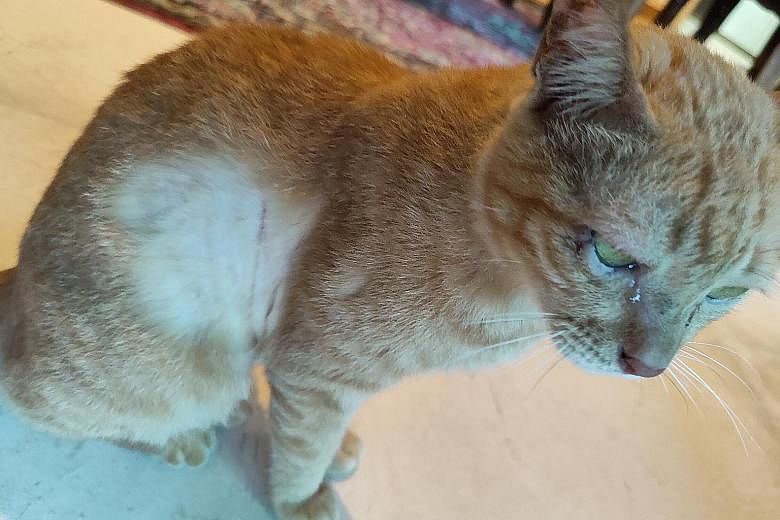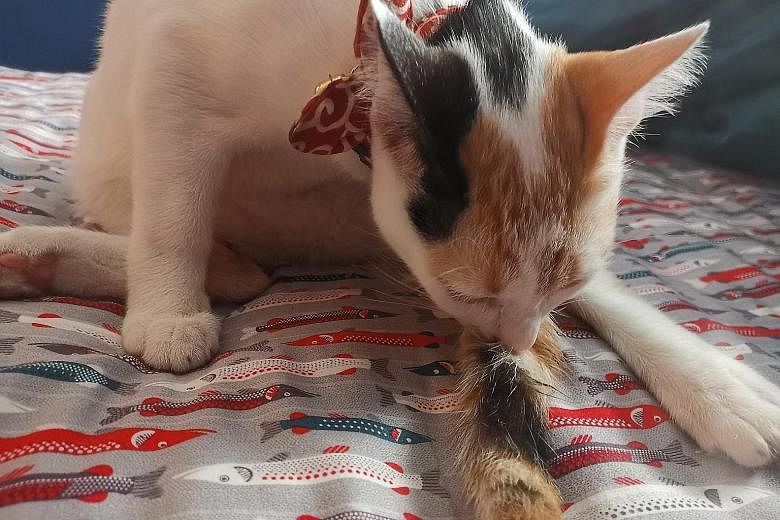Cat suffering from fur loss
I have a 12-year-old male cat. He loses hair, but it generally grows back. But this time, the regrowth is taking longer. Also, his eyes are watery. His meals comprise mainly dry food.
K.S. Sankaran
Does your cat show signs of itchiness, especially at the spot where there is hair loss? Is the spot where he loses hair the same every time and growing bigger? Or does the hair loss happen at different parts of the body?
There are many causes of hair loss and these would be some of the questions your vet may ask. Ensure that anti-parasitic treatments are up to date for your cat.
The hair loss at the flank of the body looks extensive, although the spot does not look inflamed.
Take your cat to a vet for a thorough examination to rule out common causes such as parasites and allergies. A blood test may also be necessary to rule out metabolic or infectious causes, which may also contribute to the hair loss.
For eye discharge, there are many causes and it is important to identify if there are accompanying respiratory signs.
There are viral and bacterial diseases in cats that may result in ocular or nasal discharge, or both. A visit to the vet is recommended to rule out these infectious causes.
Eye discharge usually occurs when there is irritation to the eyes or if there is a tear drainage problem. Irritation can arise from conditions such as infection, certain eye diseases, trauma, reaction to irritants such as allergens or dust, or eyelash or eyelid abnormalities.
Licking problem in cat
Our kitten is about five months old and has a habit of licking her tail until the fur becomes quite wet. She also has a floor mat she always licks at a particular corner. When she is not licking anything, her tongue will simulate the action for a while and then she goes back to licking her tail.
Pamela and Yun Hui
From the video, the tongue movement and position are not normal for a cat at rest and there could be signs of mild head tremors as well, which may indicate a neurological issue.
To be sure, a neurological examination at the vetis the first step, together with a complete physical examination. Blood tests may be conducted to identify infectious causes or metabolic disorders. It is important to rule out congenital, neurological, infectious or metabolic issues before you consider a behavioural cause.
-
Fun fact
-
Did you know that eating poop can be healthy? At least, this is the case for rabbits.
Rabbits produce two types of droppings - regular faecal pellets to be disposed of and cecotropes. Cecotropes are dark brown squishy, grape-like pellets that contain lots of protein and vitamins. Rabbits ingest these to get the nutrients they need to stay healthy.
Constant licking at an area could also be due to pain or itchiness there. Again, it is vital to rule out these medical causes before approaching the issue from a behavioural angle.
Dog scratches till skin bleeds
My dog Mimi is a mix of maltese and dachshund and has been licking in the past month. She also scratches her nipples until the skin bleeds. She is almost 12 and had her uterus removed in January. She eats mostly steamed chicken breast for lunch and dry food as snacks. She drinks about 100ml of water daily. How do I stop her from scratching and licking?
Gerald Lee
There are many causes of skin itch.
-
Pets' Day Out: Adopt a pet
-
Keen to adopt a furry companion? Catch e-Pets' Day Out on July 25 at 3pm on the AnimalBuzzSG Facebook page and meet the animals up for adoption from animal welfare groups.
You want to first rule out common causes such as parasites and allergies.
Parasites such as fleas and mites can cause a dog to itch and can be easily treated and prevented, so ensure that Mimi's parasite treatments are up to date.
Another common cause is allergy. Allergic reactions can be caused by food or contact.
To rule out food allergies, your vet may put Mimi on an elimination diet trial for eight to 12 weeks each time to determine if her condition improves by avoiding certain ingredients.
Contact allergy typically requires a form of allergy testing, which certain veterinary clinics can conduct. If the allergen can be found, avoidance will be the main strategy to prevent the skin condition from flaring up again.
Some owners may still find it difficult to manage their dog's skin conditions despite trying various treatment and management methods.
There are products that have a longer-lasting effect in alleviating itchiness. Ask your vet to see if such treatments are suitable for your dog.
Finding the root cause of the itch and a suitable treatment may take some time, so be patient.
• Answers by Dr Han Zi Yang, a senior veterinarian in the Animal & Veterinary Service and owner of two mixed-breed rabbits, Nolla and Tubby.




